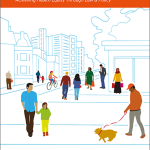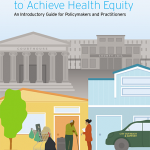COVID-19 has taught us that justice strengthens public health, and injustice weakens it. Health is not a matter of individual choice. Rather, health outcomes are deeply influenced by institutional and structural forces that affect who has access to opportunities and the resources needed to thrive.
Chief among the structural forces creating unjust access to health-promoting opportunities and resources is subordination based on markers of social stigma such as race, gender, sexuality, and class. Subordination is a pressing but often-overlooked public health problem that directly influences the social determinants of health.
Uprooting this type of injustice and advancing health equity require a new alliance of public health advocates, civil rights lawyers, and social justice leaders. The Civil Rights of Health: A New Approach to Challenging Structural Inequality, a journal article recently published in the UCLA Law Review, describes how such an alliance could help educate policymakers and the public about the health effects of structural inequities, create new legal tools for challenging subordination, and ultimately reduce or eliminate unjust health disparities.
Writing from multidisciplinary perspectives, the authors propose that understanding health as a matter of justice and understanding civil rights law as a health intervention can strengthen public health advocacy.
The article maps out three major pathways through which health disparities arise:
- Populations that are disproportionately burdened by disease, illness, and premature death as a result of political and social forces
- Places that heavily influence the opportunity to lead a long and healthy life
- Unequal access to power that limits meaningful participation in civic engagement and public decisionmaking
The authors exemplify a collaborative relationship between civil rights, public health, and social justice partners. Angela P. Harris is a civil rights scholar and professor emerita at the University of California, Davis, School of Law. Aysha Pamukcu is a public health attorney and former health equity lead at ChangeLab Solutions who works to accelerate justice movements through policy and philanthropy. ChangeLab Solutions senior attorney Katie Hannon Michel provided research assistance and thought partnership during the writing process.
12/15/20


